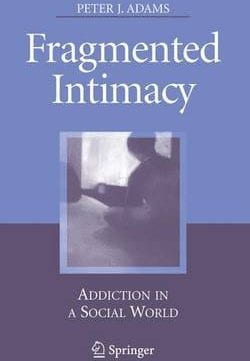Peter J. Adams Book Description
Fragmented Intimacy: Addiction in a Social World
New York: Springer, 2008 (339 pages) ISBN: 9780387726601 9780387726618
Content
I recall during my early years as a clinical psychologist being asked by hospital staff to speak with a 32-year-old man addicted to alcohol who was being discharged following treatment for pancreatitis. This had been his third admission for the same illness, and hospital practitioners were exasperated by his choice to continue drinking despite being repeatedly told it would cause irreparable damage to his pancreas from which he would be unlikely to survive. I met him in a side-room on the ward. He sat in his pajamas in the corner of the room, thin and ashen looking, with a worried frown fixed across his face. Our conversation was initially stilted and I was trying hard not to replicate the lectures and sermons he was likely to have already received from hospital staff. As we talked I was able to piece together bits of information about his current circumstances: he lived alone, he was unemployed, and his only family contact was with a brother who visited to check on him occasionally. He started to relax into the conversation and then talked about his long struggles with alcohol: his drinking had begun in his early teens; it had provided him with confidence and friendships; he had had some serious motor vehicle accidents; he had tried to stop drinking but soon continued; he had lost friends, jobs, and family relationships; and in response he had increasingly sought intoxication as a refuge.
Fragmented Intimacy transcends familiar concepts of addiction by focusing not on addicts in isolation but on the social contexts that are disrupted and on the struggle that affects all those involved as they attempt to regroup and initiate change. Applicable to drugs, alcohol, and gambling, this engagingly written book offers both innovative theory and practice-strengthening interventions.
Peter Adams’ social-ecology framework examines in depth how addiction disrupts social identity, becoming the dominant relationship in a person’s life and leading thereby to a weakening of connections to family, friends, workplace, and community. It examines how in the long-term course of an addiction one-on-one counseling will have little effect unless it assists in the re-engagement of these core intimacies. The author enhances the reader’s understanding with vignettes of addicted individuals’ lives as relationships are altered (and insights from such chemically-intimate authors as Burroughs and Poe), new takes on the therapeutic relationship, and examples of families, neighborhoods, and communities mobilizing as powerful forces for re-entry.
A sample of the coverage:
- Rethinking addiction through the lens of intimacy.
- Social processes in intimacy versus social processes in addiction.
- Effects of addiction throughout the individual’s social networks.
- Opportunities for intervention at different stages of addiction.
- Resilience building at the individual, family, and community levels.
- Guidelines for family members in initiating change.
- Using social approaches to complement mainstream forms of therapy—starting with assessment.
Fragmented Intimacy provides fresh perspective and new tools for frontline addiction counselors, clinical and health psychologists, social workers, and public health professionals while remaining accessible to the researcher or student in these fields. Its focus on the role of intimacy also provides a useful guide to family members in their response to addicted loved ones.
Dr Alex Paton, (UK Physician)
Peter Adams… takes the radical view that treating an addictive individual alone without mobilizing that person’s social environment is almost bound to fail… Adams explores the social dimension in long and loving detail, the theory softened throughout by the case histories of two couples and two pairs of parent/children… If you want an exciting read, this is it. The author is an enthusiast who has no illusions about the challenges of people, resources and money needed to set up and above all continue such a socially oriented scheme, which may take years to rescue the individual sufferer. Are the professionals prepared to take the initiative?”(Review in Alcohol and Alcoholism, 44(4):435) . See full review
Dr Tom Walker (Keele University, UK, 2009)
Most work on addiction concentrates on individuals, primarily the addict but also family members or the family conceived as an individual entity. In this useful and informative book, Peter Adams introduces a different approach—one that concentrates on relationships. The book illustrates how by taking this approach we can more clearly see the ways in which an addict’s relationship with an addictive substance or process can affect the addict’s relationships with other people and aspects of their life. But this is not all, it also illustrates how the addict’s strengthening relationship to the addictive substance can affect the relationships of those close to him or her (for example, the relationships between family members of the addict)… As the book progresses the subject matter becomes more and more applied. Later chapters make use of the approach introduced earlier to illustrate some of the features of addictive relationships, and show how this approach can aid our understanding both of what is going on in such relationships and some of the problems with standard ways of dealing with addiction. These chapters are the most interesting in the book as they demonstrate the practical value of adopting a relationship centered approach. In doing this they help to show that this approach can pick up on aspects of addiction that are missed (or not fully understood) when using a more standard approach to addiction because they don’t fit into the individualistic paradigm that is being used to assess it from that perspective. Addiction, 104(4), 677-678. See full review
